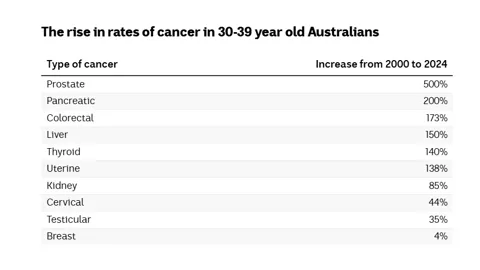
Cancer has long been viewed as a disease of ageing. But a growing body of research, and the voices of experts, are telling a different story. A shift is underway. And pancreatic cancer is at the forefront of this worrying trend.
The Four Corners episode, Generation Cancer, investigates the startling rise in cancer diagnoses among Australians under 50. The program paints a confronting picture, one supported by new data and a growing number of young people facing a life-altering diagnosis far earlier than expected.
Among the most aggressive and under-recognised cancers featured is pancreatic cancer, and what we’re seeing is deeply concerning.

Source: Cancer Australia
This is not an isolated statistic. A recent Australian-led study published in BMJ Oncology (April 2024) revealed a 79% increase in early-onset cancer cases globally between 1990 and 2019, with pancreatic cancer among those showing the most significant rise in mortality and burden of disease in younger cohorts.
The trend is echoed in data from the Global Burden of Disease study, which identified pancreatic cancer as one of the most concerning cancers in under-50s, both in terms of rising incidence and its profound impact on years of life lost.
Why are we seeing this shift?
The causes of this cancer rise are not yet fully understood — and that’s part of the challenge. Researchers suggest a mix of factors could be contributing, including:
Improved awareness and referral pathways, advancements in imaging and biopsy techniques, and enhanced access to diagnosis
- Increased exposure to environmental and lifestyle risk factors earlier in life
- Changes in gut microbiota
- Genetic predispositions and inherited syndromes
- Delayed diagnoses due to lack of awareness among both the public and healthcare providers
More research is needed to understand the causes with more certainty, especially for pancreatic cancer specifically.
What’s clear is that we can no longer assume age offers protection — and we must reframe how we talk about risk, symptoms, and early detection.
Know the signs. Know the risks.
Pancreatic cancer is often diagnosed late because early symptoms are vague or mistaken for less serious conditions. But recognising the signs — and advocating for yourself or a loved one — can be life-saving.
Key symptoms to watch for:
- Unexplained weight loss
- Abdominal or back pain
- Jaundice (yellowing of skin or eyes)
- Loss of appetite
- Changes in digestion or bowel habits
- Fatigue

Family history matters
Around 10% of pancreatic cancer cases are hereditary. If you have a personal or family history of pancreatic cancer or related conditions (like BRCA mutations, Lynch syndrome or hereditary pancreatitis), you could be at increased risk.
To help Australians better understand their risk, we’ve developed a free, quick and confidential tool:
Pancreatic cancer remains the third-deadliest cancer in Australia, and the toughest common cancer to treat. Survival rates have barely shifted in decades. But we know what’s needed — and with enough will, progress is possible.
What needs to change
We need:
🔬 More research funding — to understand what's driving early-onset disease and to develop better treatments
🏥 Earlier detection pathways — especially for high-risk individuals
📣 Increased public awareness — so symptoms are taken seriously, no matter your age


